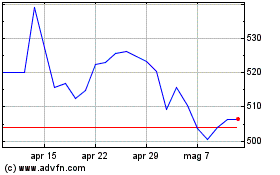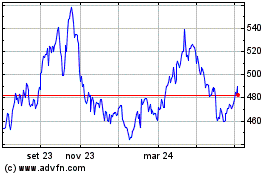Cheaper Oil Ratchets Up Pressure on Energy Sector
09 Marzo 2020 - 6:24PM
Dow Jones News
By Sarah McFarlane
Oil companies are expected to slash investments and cut
shareholder returns after crude prices sank to their lowest level
in four years.
The Saudi Arabian Oil Co. this past weekend decided to discount
oil prices after the Organization of the Petroleum Exporting
Countries and Russia failed to agree to a production cut in
response to the coronavirus epidemic. The move, along with the
kingdom's plan to increase production starting in April, threatens
to exacerbate a glut in oil supply. And publicly traded oil
companies -- including Aramco, as the Saudi state-run oil giant is
known -- are collateral damage in the conflict.
BP PLC's shares fell by more than 20% on Monday, while Royal
Dutch Shell PLC was down 14%, France's Total SA off 12%, and Exxon
Mobil Corp. down 9%. On Sunday, Aramco's shares fell below their
December listing price, in what was the world's largest initial
public offering.
Oil companies were already the laggards of equity markets.
Shareholders are questioning their long-term future in a lower
carbon world where oil demand is expected to decline. At the same
time, companies' earnings are eroding due to lower energy prices in
2019 compared with the previous year.
The latest price slide will mean they will be hard pressed to
meet hefty shareholder returns and maintain investments, all the
while paying down debt.
"The first thing to go will probably be the share buybacks,"
said Santander analyst Jason Kenney. "Then there will be an
assessment of absolute capital expenditure needs. Maintenance capex
levels are somewhere in the 30-40% range of annual spend, so
there's a lot of money that can be flexed."
Shell already sounded a warning on the sustainability of its $25
billion share-buyback plan in January, when Chief Executive Ben Van
Beurden said the program's pace was "subject to macro conditions
and further debt reduction." With $15 billion in buybacks completed
by January, the company was due to conclude the program by the end
of this year, having launched it in mid-2018.
Total was due to buy back $2 billion in shares this year, but
its plan assumes an oil price of $60 a barrel. Brent oil prices --
the global benchmark -- have almost halved since the start of the
year to around $35 a barrel. According to estimates from
consultancy WoodMackenzie, a $10 a barrel move in oil price has a
$40 billion impact on global cash flow per quarter for the oil
sector.
If companies rein in spending, the belt-tightening is likely to
hasten a peak in oil supply which Christyan Malek, JP Morgan's head
of oil research for Europe and the Middle East, forecasts was
already due in 2022. "All you are doing now is accelerating
it."
The sharp drop in oil prices will hit companies' debt positions
at a time when many balance sheets were already stretched.
In the fouth quarter, BP's gearing -- the ratio of net debt to
the total of net debt and equity -- was 35% including leases, down
from 36% in the third quarter but above the company's long-term
target of between 20% and 30%.
"Considering both the financial framework and balance sheet
position, we see BP as in the most-stressed position, largely due
to the starting point on gearing, which is the highest in the
sector, followed by ENI and Exxon," said Biraj Borkhataria, co-head
of European energy research at RBC Capital Markets.
Shell said in January that its gearing was likely to remain
above its target of 25% this year.
Dividends are expected to remain sacrosanct, analysts said.
Exxon has increased its dividend annually for 37 years and Shell
hasn't cut its since World War II.
"I think there's going to be every effort to cover dividends...
it's a red line really," said Santander's Mr. Kenney.
Cheaper oil could also slow the energy transition to the lower
carbon future that investors and policymakers are increasingly
demanding. The move toward electric vehicles and renewable energy
has threatened business models and deterred some investors from
holding oil stocks due to the growing risks around their
future.
"The worst thing that those people need is a low oil price, as
that will certainly discourage substitution away from oil," said
Mr. Kenney, referring to climate activists.
Write to Sarah McFarlane at sarah.mcfarlane@wsj.com
(END) Dow Jones Newswires
March 09, 2020 13:09 ET (17:09 GMT)
Copyright (c) 2020 Dow Jones & Company, Inc.
Grafico Azioni Bp (LSE:BP.)
Storico
Da Mar 2024 a Apr 2024

Grafico Azioni Bp (LSE:BP.)
Storico
Da Apr 2023 a Apr 2024
